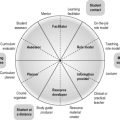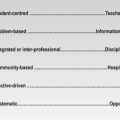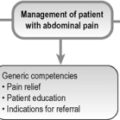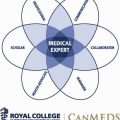32 Assessment for admission to medicine and postgraduate training
The importance of selection
• Owing to low attrition rates, the admission of students to medical studies is almost equivalent to graduating a student. Once students are selected for admission to medicine they will almost certainly complete their medical studies and graduate as a doctor.
• There are political and other pressures to widen access to medical studies and there is wide recognition that doctors should be matched to the community they serve. Some ethnic and social classes may have been disadvantaged in the selection process and this needs to be taken into consideration in the admissions process.
• Once students graduate they are more likely to practise in the geographical area or type of community in which they originally lived.
• The criteria used for selection were based traditionally on academic qualifications. It was assumed that if a student achieved top grades in their studies at school they would automatically develop the competencies expected of a good doctor. This is not necessarily true, and the personal qualities of the potential doctor are recognised to be important as well as their academic qualifications.
• There may be advantages in choosing students whose career goals match the mission of the medical school, for example in relation to a commitment to rural practice.
Approaches to selection for entry to medicine
A Range of methods
In general, the criteria for good assessment discussed in Chapter 28 also apply to the selection process. This must be seen to be fair and to be reliable and valid. For this to be so, evidence to support the selection decision should be obtained from a range of sources. The motivation of the student to study medicine must also be taken in to account. Whatever approach to selection is adopted it is important that criteria such as academic ability, personal qualities and ethnicity and any weighting given to the different factors are made explicit. When the entry requirements are considered, attention should be paid to the expected exit learning outcomes of the medical school. Evidence that the student meets minimal requirements relating to each outcome domain prior to entry to medicine is advisable. For example, a required level of competence relating to the communication or attitudinal domains may be specified prior to admission. Learning outcome frameworks that can be used for this purpose are discussed in Chapter 8.
Reflect and react
1. You should familiarise yourself with the selection procedure in your institution. To what extent does this reflect the attributes expected of a future doctor?
2. To what extent do the principles of good assessment described in Chapter 28 apply to the selection process in your institution?
3. If you are involved in a selection committee, an interview panel or as an assessor in an MMI you should ensure that you are familiar with the rules and complete the necessary training.
4. Consider how social accountability of universities and training organisations should be reflected in the selection process and the widening of access.
Eva K.W., Rosenfield J., Reiter H.I., et al. An admissions OSCE: the multiple mini-interview. Med. Educ.. 2004;38:314-326.
A description of this relatively new approach.
Harris S., Owen C. Discerning quality: using the multiple mini-interview in student selection for the Australian National University Medical School. Med. Educ.. 2007;41:234-241.
A description of the use of the MMI in the selection of students in one school.
McGaghie W.C. Student selection. In: Norman G.R., van der Vleuten C.P.M., Newble D.I., editors. International Handbook of Research in Medical Education. London: Kluwer Academic Publishers, 2002. (Chapter 10).
A useful summary of medical student selection criteria and some of the methods adopted.
Prideaux D., Roberts C., Eva K., et al. Assessment for selection for the health care professions and specialty training: consensus statement and recommendations from the Ottawa 2010 conference. Med. Teach.. 2011;33:215-223.
Recommendations from an expert group on assessment for selection in medicine.







